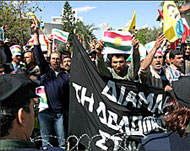Syrian-Kurd clashes continue
Eleven people have been killed in fresh clashes between Arabs and Kurds in two towns in northeast Syria after weekend riots, according to local Syrian residents and Turkish security forces on Tuesday.

Syrian security forces imposed a curfew in the town of Ras al-Ain, near the Turkish border town of Ceylanpinar, after five people were killed in fighting there on Monday.
Local Syrian sources contacted by telephone from Turkey said a senior member of a local tribe was among those killed. Thirty people were injured in the clashes.
In the town of Ammuda, Kurdish groups attacked a police station on Monday, killing a police chief, four police officers and a soldier, the sources added.
They said the Syrian military had sent additional forces to the region to calm the situation. Security measures were also increased on the Turkish side of the border.
Warnings
The latest fighting followed a weekend of Kurdish rioting which killed at least 14 people further east in the Syrian town of al-Qamashli, where a railway station, schools and public offices were badly damaged.
|
“The policy of the stick will only assist the plots of foreign forces which want to destabilise Syria and impose conditions on it” |
The violence in al-Qamashli, an ethnically mixed town near the Turkish and Iraqi border, ended after Interior Minister Ali Haj Hammud flew to the area to take control and the authorities threatened those responsible with the “severest punishments”.
State Department deputy spokesman Adam Ereli urged Damascus “to refrain from using increasingly repressive measures to ostracise a minority that has asked for a greater acceptance and integration into Syrian life.”
Relations between Damascus and Washington are tense as the United States moves to impose new sanctions against Syria.
Rowdy sports match
The violence was triggered by a brawl and stampede at a football match in Qamashli and spread to several towns nearby.
Sources close to government thinking said Kurdish politicians had tried to turn the match riot into a political issue, a reference to the grievances of about 200,000 Kurds not recognised as citizens.
 |
|
Kurds demonstrated outside the |
Meanwhile, hundreds of Kurdish Syrians have been arrested since rioting broke out on Friday said human rights lawyer Anwar Bunni on Tuesday.
“We have a list of 300 people arrested around Dummar, in the
western suburbs of Damascus, and reports of an unspecified number of arrests in the northeastern regions,” Bunni said.
“The policy of the stick will only assist the plots of foreign forces which want to destabilise Syria and impose
conditions on it,” he warned, in reference to the threat of US sanctions.
Population simmering
Bunni said he had gone on Sunday to Dummar, where Kurds in the capital are concentrated, in an effort to calm local anger at the weekend events.
He said Dummar residents had taken to the streets, destroying a police car and electricity poles, and police anti-riot squads had been sent to the scene.
There are about two million Kurds in Syria’s 17 million population, but Syrian officials avoid reference to Kurds as a distinct minority and stress the importance of national unity.
Kurds and other minorities have held senior government and army positions.
On Monday, about 20 Kurds entered the Syrian consulate in Geneva in a protest over the deaths at the weekend.
Several dozen Kurds also forced their way into the grounds of the Syrian embassy in Brussels on Saturday during a protest apparently sparked by the unrest in Syria.